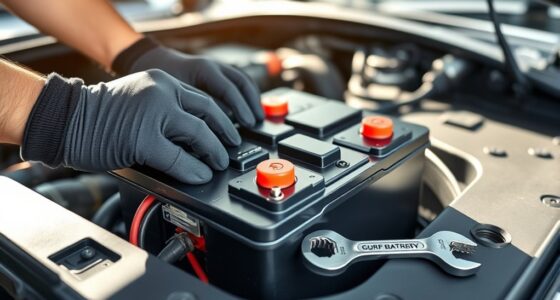Neglecting vital engine fluids is a fast track to self-destruction. You must regularly check engine oil, coolant, and transmission fluid to avoid catastrophic failures. Low or dirty oil can lead to overheating and severe engine wear, resulting in costly repairs. Failing to maintain coolant levels risks overheating, potentially leading to engine damage. Don't overlook the transmission fluid either, as neglect can cause rough shifts and major repairs. Keep a close eye on these fluids to guarantee your engine runs smoothly. There's a lot more to learn about keeping your engine in top shape, so keep going!
Key Takeaways
- Regularly check engine oil levels; neglect can lead to engine wear, overheating, and costly repairs.
- Monitor coolant levels to avoid overheating, which can cause severe engine damage and expensive repair bills.
- Inspect transmission fluid for cleanliness and proper levels; dirty or low fluid can result in shifting issues and increased repair costs.
- Look for signs of oil leaks, low coolant, or dirty transmission fluid to catch potential issues before they escalate.
- Adhere to a maintenance schedule for oil changes, coolant checks, and timing belt inspections to prevent catastrophic engine failure.
Essential Engine Fluids Overview
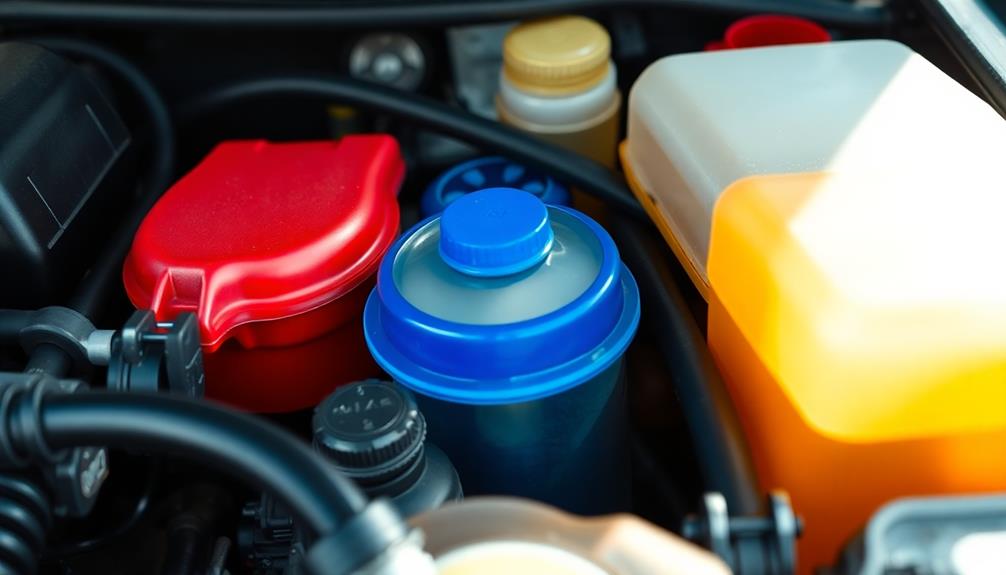
When it comes to maintaining your vehicle, understanding essential engine fluids is key. Engine oil is your engine's lifeblood, lubricating moving parts and preventing overheating. Regular checks of this fluid are vital for guaranteeing your engine runs smoothly and lasts longer. If you neglect it, you're risking serious damage.
Next up is coolant, which regulates your engine's temperature. It prevents overheating and protects against severe engine damage. You should monitor your coolant levels frequently, especially during extreme weather. Low coolant can lead to catastrophic issues that could leave you stranded.
Don't forget about transmission fluid, either. This fluid guarantees smooth gear shifts and protects the components of your transmission.
Routine inspections are necessary to avoid costly repairs and frustrating breakdowns. If your transmission fluid is low or dirty, you may experience shifting problems, which can lead to more significant issues down the road.
Consequences of Neglecting Oil
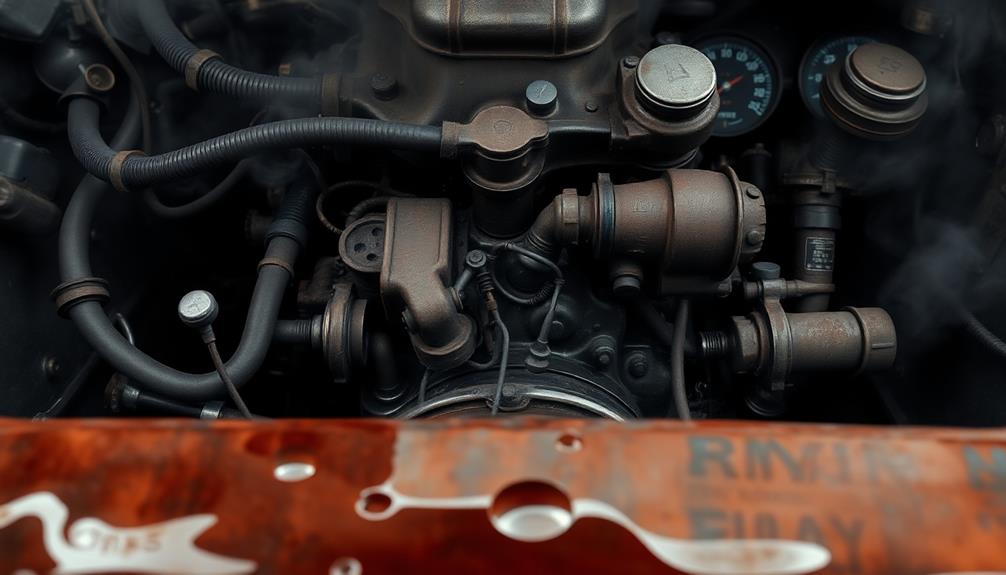
Neglecting your engine oil can accelerate wear on critical components, putting your vehicle at serious risk.
When lubrication fails, overheating becomes a real threat, leading to expensive repairs or even total engine failure.
Keeping an eye on your oil levels is essential to prevent these costly consequences.
Engine Wear Acceleration
Regularly checking your engine oil is essential for maintaining its health, as neglect can lead to severe wear and damage. When you skip oil changes, the oil breaks down over time, losing its ability to lubricate effectively, much like how high refresh rates enhance gaming experiences.
This can cause harmful metal-on-metal contact, accelerating engine wear. Insufficient oil levels also contribute to overheating, as oil is vital for dissipating heat in your engine.
Here are some key consequences of neglecting oil maintenance:
- Engine wear increases dramatically, shortening your engine's lifespan.
- Contaminated oil introduces particles that scratch engine surfaces, causing further damage.
- Sludge buildup obstructs oil passages, impairing circulation and leading to catastrophic failure.
- Costly repairs result from damage that can easily reach thousands of dollars.
Overheating Risks
Overheating poses a notable risk to your engine's health, especially if you let oil maintenance slide. Regular oil changes are vital; neglecting them can lead to increased friction and inadequate lubrication, causing your engine temperature to rise.
As engine oil degrades over time, failing to check its level and condition can result in overheating, putting your engine at serious risk. When oil levels are low or contaminated, you may experience oil starvation. This dangerous condition can lead directly to engine failure, resulting in costly repairs that you could've avoided.
Overheating can warp or seize engine components, often necessitating a complete engine replacement if you don't address the issue promptly. The risk of overheating skyrockets after 5,000 to 7,500 miles without an oil change, particularly in high-performance or older vehicles.
Lubrication Failure
Just one missed oil change can lead to serious lubrication failure in your engine. When you neglect regular oil changes, you're inviting trouble. Increased friction and overheating can wreak havoc on your engine's components, resulting in catastrophic damage. In the worst-case scenario, your engine might need a complete rebuild.
Here are some consequences of ignoring oil maintenance:
- Increased wear: Lack of lubrication leads to metal-on-metal contact, rapidly wearing down critical parts.
- Sludge formation: Without proper oil flow, sludge builds up, obstructing crucial pathways and exacerbating wear.
- Seized components: Insufficient lubrication can cause engine parts to seize, leading to a total breakdown.
- Performance drop: Engines without adequate lubrication suffer decreased performance and fuel efficiency.
Regular oil maintenance isn't just a recommendation; it's imperative. Ignoring this can void warranties and raise the chances of engine failure.
Don't let a simple task become a costly mistake. Keep up with your oil changes to guarantee your engine runs smoothly and efficiently. Your engine depends on it!
Importance of Coolant Levels
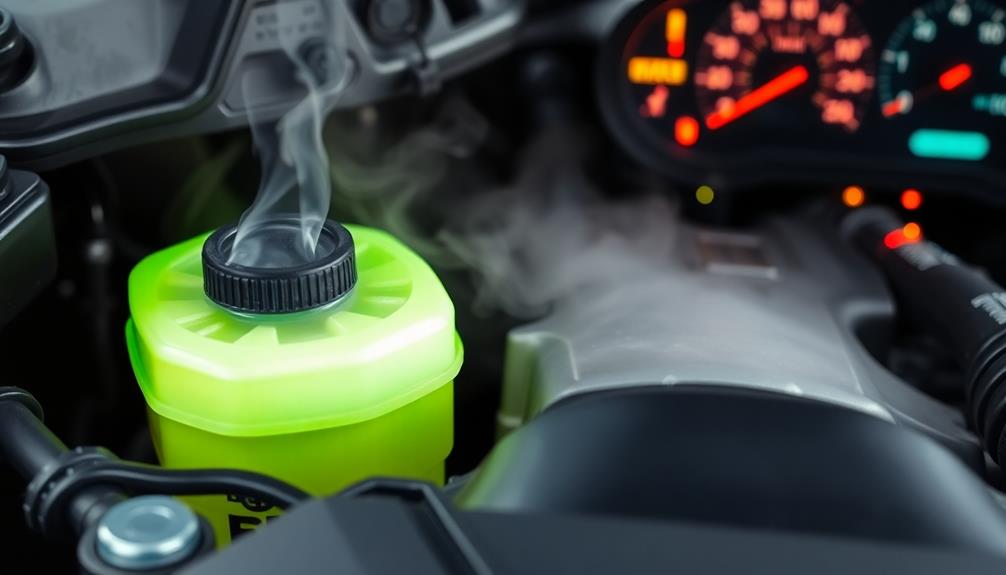
Maintaining proper coolant levels is essential to prevent your engine from overheating and avoid costly repairs.
When coolant is at the right level, it enhances system efficiency and keeps everything running smoothly.
Regular checks can save you from serious issues down the road.
Prevent Engine Overheating
While you mightn't think about it often, keeping an eye on your engine's coolant levels is essential to prevent overheating. Low coolant can lead to severe engine damage, such as warped cylinder heads and blown gaskets.
The coolant circulates through your engine, absorbing heat and helping to maintain ideal temperatures. If the levels drop, your engine struggles to dissipate heat effectively.
To avoid costly repairs, follow these guidelines:
- Check coolant levels at least once a month.
- Replace coolant when it shows signs of contamination.
- Monitor the temperature gauge for any unusual readings.
- Look out for warning signs like steam from the engine or the check engine light illuminating.
Ignoring your coolant can lead to repair bills exceeding $1,500 due to overheating.
By making coolant maintenance a habit, you protect your engine and keep it running smoothly. Remember, a little attention now can save you from a major headache later.
Enhance System Efficiency
Properly managing your coolant levels can greatly enhance your engine's overall efficiency. When your coolant levels are ideal, you're preventing the engine from overheating, which is essential for avoiding severe damage like warped cylinder heads or blown gaskets.
Coolant doesn't just regulate temperature; it also protects against corrosion and lubricates the moving parts within the cooling system.
To guarantee your engine runs smoothly, regularly check your coolant levels. If you notice signs like engine overheating, a sweet smell from leaking coolant, or puddles under your vehicle, it's time to act.
An ideal coolant mixture usually consists of 50% coolant and 50% distilled water, striking the perfect balance for effective heat transfer while preventing freezing or boiling over.
Maintaining proper coolant levels not only enhances efficiency but also keeps your engine performing at its best. Ignoring this essential fluid can lead to costly repairs down the line, so make it a habit to check.
Your engine depends on it, and you'll save yourself a fortune in the long run by preventing overheating and guaranteeing everything runs smoothly.
Avoid Costly Repairs
Ignoring your coolant levels can lead to expensive repairs and major headaches. Low coolant can cause your engine to overheat, risking severe damage or even total failure.
Regular maintenance checks are essential, especially before long trips, to avoid these costly consequences.
Here are some key points to keep in mind about coolant maintenance:
- Prevention is Key: Regularly check coolant levels to prevent overheating.
- Change Intervals: Change your coolant every 30,000 to 50,000 miles to maintain peak performance.
- Watch for Signs: Look out for frequent overheating, visible coolant leaks, or a low coolant warning light on your dashboard.
- Corrosion Protection: Proper coolant levels protect your engine from rust and sludge buildup.
Transmission Fluid and Performance

Your vehicle's transmission fluid plays an essential role in its overall performance, acting as a lubricant for the moving parts within the transmission. Without adequate transmission fluid, you risk increased friction, which can lead to wear and tear on crucial components. This degradation often occurs due to heat and contamination, making regular maintenance necessary.
To maintain peak performance, you should check your transmission fluid levels and quality every 30,000 to 60,000 miles, depending on your vehicle model. Low or dirty fluid can result in delayed or rough shifting and even slipping gears. Ignoring these issues may lead to costly transmission repairs, which can easily be avoided with timely maintenance.
Moreover, regularly inspecting your transmission fluid not only prevents performance-related problems but can also extend the life of your transmission. Keeping an eye on this important fluid guarantees smooth shifting and enhances your overall driving experience.
Signs of Fluid-Related Issues
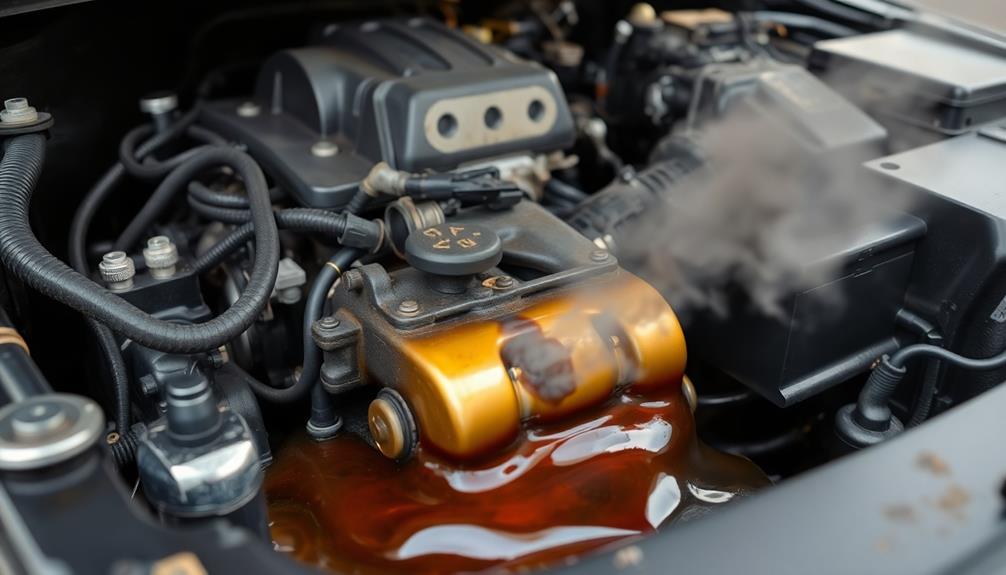
Fluid-related issues can manifest in various ways, and spotting the signs early can save you from costly repairs.
By being vigilant about your vehicle's fluids, you can prevent severe damage to your engine and its components.
Here are key signs to watch for:
- Oil leaks: Look for any signs of oil pooling or dripping around the timing chain cover. This could indicate a failing seal that may lead to inadequate lubrication.
- Coolant levels: If your engine is overheating, check your coolant levels. Low coolant could signal a failing water pump, affecting not just temperature but also the timing belt performance.
- Transmission fluid: Regularly inspect your transmission fluid for color and consistency. Dirty or low fluid can cause shifting issues that stress your engine.
- Timing belt wear: While not a fluid, regular checks for cracks or fraying on your timing belt are essential. A snapped belt can lead to catastrophic engine damage.
Preventative Maintenance Tips
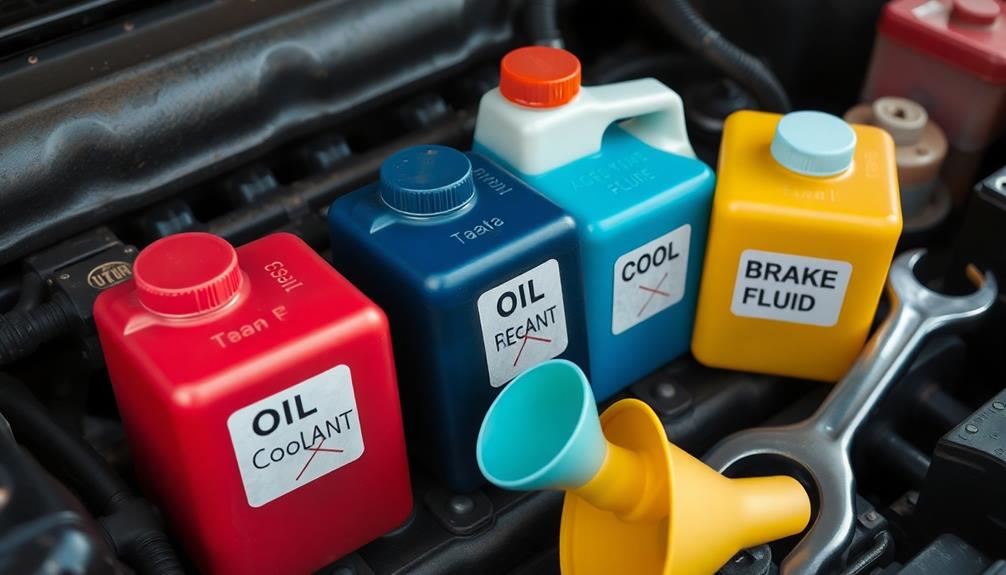
To keep your engine running smoothly, regular preventative maintenance is vital. Start by inspecting and replacing your timing belt every 100,000 miles. This simple step prevents cracking and potential engine failure, saving you from costly repairs down the line.
Don't overlook oil changes, either; they're essential for maintaining your timing chain's lubrication, allowing it to last as long as your engine. Additionally, just as it's important to monitor your vehicle's fluids, staying informed about cold medications overview can help you effectively manage your health during cold seasons.
Watch for signs of wear, like cracking in the timing belt or unusual noises from the timing chain. Catching these issues early can save you a fortune in repairs. Ignoring preventative maintenance can lead to severe engine damage, so make it a priority to extend your engine's life.
Keeping a maintenance log is another smart move. Track your fluid levels and replacement intervals to guarantee you never miss critical checks. This habit will help you avoid the dreaded engine self-destruction.
Frequently Asked Questions
How Do You Tell if Your Engine Is Destroyed?
If your engine's misfiring, making strange noises, leaking oil, or showing signs of a damaged timing belt, it's time to worry. Ignoring these symptoms could mean serious damage or even engine failure. Don't wait!
How Often Should I Check Engine Fluids?
Think of your engine as a well-tuned orchestra; each fluid plays an essential note. You should check engine oil monthly, coolant every few months, transmission fluid twice a year, and brake fluid every six months. Stay in harmony!
Will a Blown Engine Still Drive?
You can drive a vehicle with a blown engine for short distances, but it's risky. Severe damage can occur, so it's best to stop immediately and get professional help to avoid costly repairs.
Can You Save a Blown Engine?
Imagine a phoenix rising from ashes. Yes, you can save a blown engine if it's not severely damaged. Rebuilding or replacing parts might cost a few hundred to several thousand, but it's often worth it.
Conclusion
Your engine's fluids are the lifeblood of your vehicle, much like water is to a thriving plant. Neglecting them is like ignoring a wilting flower; it won't survive long without care. By regularly checking oil, coolant, and transmission fluid, you nurture your engine, ensuring it runs smoothly and efficiently. Remember, a well-tended engine blooms with power and longevity, while neglect can lead to a catastrophic collapse. Don't let your vehicle wilt—stay vigilant and maintain those essential fluids!





